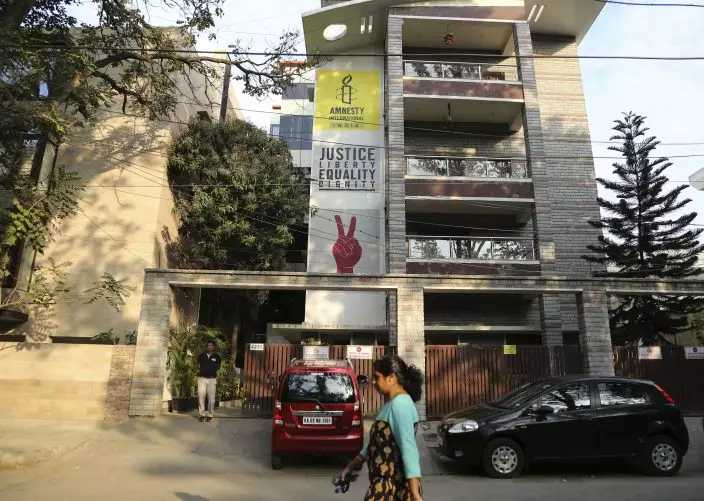Human rights watchdog Amnesty International said Tuesday that it was halting its operation in India, citing reprisals from the government and the freezing of its bank accounts by Indian authorities.
Amnesty International India said in a statement that the organization had laid off its staff in India and paused its ongoing campaign and research work on human rights, alleging that Indian authorities froze its bank accounts on suspicions of violating rules on foreign funding.
The statement said that the authorities' actions were “the latest in the incessant witch-hunt of human rights organizations by the Government of India over unfounded and motivated allegations,” and that the group's “lawful fundraising model” was being portrayed as money laundering because it has challenged the “government’s grave inactions and excesses.”

FILE - In this Tuesday, Feb. 5, 2019, file photo, a woman walks past the Amnesty International India headquarters in Bangalore, India. The Human rights watchdog said on Tuesday, Sept. 29, 2020, that it was halting its operation in India, citing reprisals from the government and the freezing of its bank accounts. Its announcement comes at a time amid growing concerns over the state of free speech in India where critics accuse Prime Minister Narendra Modi and his Hindu nationalist government of increasingly brandishing laws to silence human rights activists, intellectuals, filmmakers, students and journalists. (AP PhotoAijaz Rahi, File)
Indian authorities did not immediately confirm whether Amnesty India’s bank accounts had been frozen.
Amnesty India’s executive director, Avinash Kumar, said the accounts were frozen as a result of the group’s “unequivocal calls for transparency in the government" and accountability of New Delhi police and the Indian government regarding “grave human rights violations in Delhi riots” and Indian-administered Kashmir.
“For a movement that has done nothing but raise its voices against injustice, this latest attack is akin to freezing dissent,” Kumar said in a statement.
It is not the first time that Amnesty India has said Indian authorities targeted its operations. In 2018, Indian authorities raided its office and froze its bank accounts on similar charges.
In 2016, it faced sedition charges after Hindu nationalists objected to an event held in the southern city of Bangalore to discuss human rights violations in the disputed region of Kashmir. The charges were dropped three years later.
The rights group regularly accuses Indian authorities of committing human rights violations in Indian-administered Kashmir and has released multiple reports on the raging conflict in the region.
In 2019, the watchdog testified before the U.S. Foreign Affairs Committee during a hearing on human rights in South Asia and highlighted its findings on the use of excessive force and torture in Kashmir.
In August, it said Indian police violated human rights during deadly religious riots in New Delhi earlier this year and accused the police of beating protesters, torturing detainees and in some cases taking part in riots with Hindu mobs.
Authorities say more than 50 people were killed when clashes broke out between Hindus and Muslims over a controversial citizenship law in February in the worst rioting in the Indian capital in decades.
Amnesty India has also repeatedly condemned what it says is a crackdown on dissent and freedom of speech in India.
Its announcement to halt operations comes at a time when critics accuse Indian Prime Minister Narendra Modi and his Hindu nationalist government of increasingly brandishing laws to silence human rights activists, intellectuals, filmmakers, students and journalists.


